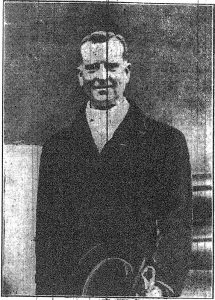
Rev J. U. N. Bardsley
Lancaster Guardian 14 Jul 1928
Lancaster LNU Chairman remembered for his ‘tireless advocacy of the League’
Every League of Nations Union (LNU) branch in the Lancaster LNU District had a Chairman. All had the same duties, though at Lancaster they were on a larger scale. Lancaster also differed by having a President as well as a Chairman, but for the first seven years the former was merely a figurehead. (1) The Lancaster Chairmen were all professional or business men who took on the chairmanship in addition to their other work, conforming to the typical member discussed by Helen McCarthy. (2) Rev. C. J. Milner was followed by Alderman George Wright who, aged 72, a senior member of both the Lancaster Liberal Association and High Street Congregational Church, was elected Chairman in 1922. He was succeeded by Rev. J. U. N. Bardsley, Vicar of Lancaster, Malcolm Smith, the Editor of the ‘Lancaster Guardian’ and Secretary of the Local Liberal Association, Alderman E. C. Parr and in 1932, another clergyman, Rev. G.H. Gibb. (3)
The Chairmen’s duties went far beyond attending the AGMs. They chaired the Executive Committee meetings, as well as public meetings where they would on occasion speak on the League of Nations and announce resolutions relating to League subjects. The Chairman took part in various demonstrations such as the 1924 ‘No More War’ weekend. In 1926 Rev. Bardsley gave a sermon to the ‘Peace-maker pilgrims’ on the need to work for international peace. In 1929, Rev. Pollard brought representatives of the three political parties together at a mass rally at which he himself spoke (4).
References/Further Reading:
(1) See ‘Lancaster LNU: Lord Richard Cavendish 1871-1946’
(2) H. McCarthy, 2011. The British People and the League of Nations. Manchester: Manchester University Press, ch.6.
(3) Lancaster Guardian, 4 Aug 1923, 23 Mar 1929 &18 Mar 1932.
(4) Lancaster Guardian, 27 Sept 1924, 5 June 1926 & 16 Nov 1929.

